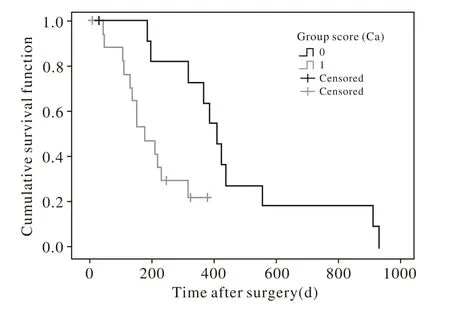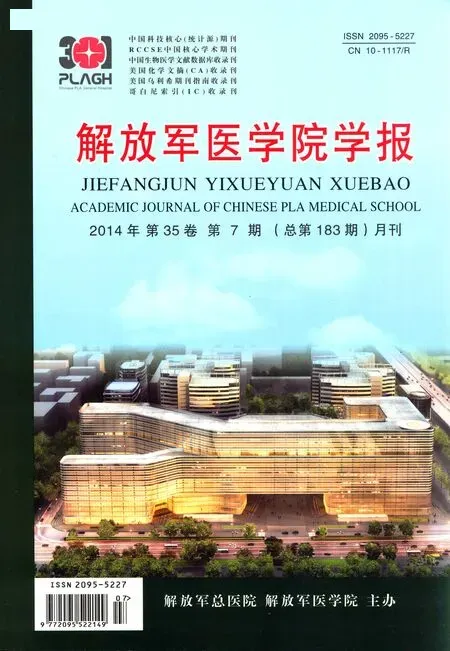葡萄糖调节蛋白78在胰腺导管腺癌中的表达及其临床意义
袁新普,周建平,李 新,高 威,董 明
中国医科大学附属第一医院 胃肠外科,辽宁沈阳 110001
葡萄糖调节蛋白78在胰腺导管腺癌中的表达及其临床意义
袁新普,周建平,李 新,高 威,董 明
中国医科大学附属第一医院 胃肠外科,辽宁沈阳 110001
目的 探讨在胰腺导管腺癌(pancreatic ductal adenocarcinoma,PDCA)中葡萄糖调节蛋白78(glucose regulated protein 78,GRP78)的表达及临床意义。方法应用免疫组织化学技术分析30例胰腺癌组织和对应的癌旁组织中GRP78蛋白的表达水平,并分析GRP78的表达与患者临床病理资料的关系。结果免疫组化结果显示GRP78在癌组织中表达明显高于癌旁组织(73.3% vs 23.3%,P<0.05)。单因素分析发现GRP78高表达的患者预后较差(P=0.009)。Western blot显示GRP78在中低分化癌细胞中的表达明显高于高分化癌细胞(P<0.05)。结论GRP78在胰腺癌组织中高表达,可能参与胰腺癌的发生发展,GRP78高表达可能有助于判断胰腺癌患者的预后。
胰腺癌;葡萄糖调节蛋白78;预后
胰腺导管腺癌(pancreatic ductal adenocarcinoma,PDCA)是一种侵袭性很强、预后很差的恶性肿瘤,5年生存率<5%[1]。主要由于胰腺癌缺乏典型的早期症状,早期又容易浸润周围组织、血管、神经,同时对放化疗敏感性差,因此探寻有助于早期诊断、辅助治疗和判断预后的分子生物学标记物成为诊治胰腺癌新的突破口[2-3]。葡萄糖调节蛋白78(glucose regulated protein,GRP78)作为内质网分子伴侣的重要一员,在蛋白质的正确折叠、转运及内质网应激中都发挥非常重要的作用[4-6]。目前研究发现GRP78在肝癌、胃癌、肺癌、乳腺癌、子宫癌、前列腺癌等肿瘤的发生、发展及生物学标记方面同样发挥非常重要的作用[7-15]。但是有关GRP78在胰腺癌中的表达及其意义,目前国内外尚无报道。本实验主要通过免疫组化和免疫印迹方法探讨GRP78在胰腺癌中的表达,并分析GRP78的表达与患者的临床病理学资料的关系。
材料和方法
1 资料 收集2006 - 2011年在我院有完整临床资料的胰腺导管腺癌标本30例,均有癌旁组织作为对照。所有患者术前均未接受放、化疗治疗,且术后病理诊断为胰腺导管腺癌。30例中,男18例,女12例,平均年龄56.9岁。每位患者均有完整随访资料。
2 免疫组化 30例癌组织和30例癌旁组织标本经石蜡包埋连续切片,厚度4 μm。经0.01%枸橼酸盐微波抗原修复20 min,3%过氧化氢孵育15 min,消除内源性过氧化氢酶,1∶100稀释的GRP78 (购自Santa Cruz)一抗4℃过夜,滴加二抗(兔抗羊IgG)稀释液室温孵育30 h,现配的DAB进行显色3 min,苏木紫复染,脱水封片。于光学显微镜下观察。结果参考文献[16]评分方法,两个独立观察者分别进行评分:①染色强度,染色弱表达1分,染色强表达2分。②计算阳性细胞所占视野面积的平均百分数,阳性细胞<5%为0分,阳性细胞数5% ~ 10%为1分,10% ~ 50%为2分,>50%为3分;上述两项得分的乘积为分级标准,>3分记为阳性。
3 统计学方法 采用SPSS19统计软件,癌与癌旁GRP78表达比较采用Wilcoxon符号秩和检验。不同临床病理学参数患者GRP78蛋白表达比较采用Fisher检验。采用Kaplan-Meier和Log-rank检验分析随访资料。Western blot结果应用Image J软件取目的蛋白在细胞中表达条带灰度(吸光度)/ GAPDH灰度值(吸光度值)的对数值,使其呈正态分布资料后,采用配对t检验比较,P<0.05为差异有统计学意义。
结 果

图 1 GRP78在胰腺癌和癌旁组织中的表达Fig. 1 GRP78 expression levels in pancreatic cancer and its adjacent tissue samples
1 GRP78在胰腺癌和癌旁组织中的表达 GRP78在胰腺癌组织中的表达率73.3%(22/30),在癌旁组织中的表达率23.3%(7/30),GRP78在癌组织中的表达明显高于癌旁组织(P<0.05),主要集中于细胞质,在细胞核、细胞膜及细胞外也有少量的表达。在癌或癌旁组织的胰岛和导管上皮细胞中,GRP78都有较高的表达。见图1。
2 GRP78的表达与临床指标及病理学的关系GRP78在中低分化的癌组织中的表达高于高分化癌组织,但差异无统计学意义。GRP78表达与患者的年龄、性别、肿瘤部位、大小、临床分期等差异均无统计学意义。见表1。
3 GRP78的表达与患者术后生存的关系 单因素分析发现,在胰腺癌组织中GRP78阳性表达患者术后生存时间208.535 d,比阴性表达患者术后生存时间466.727 d有明显的缩短,且差异有统计学意义(P=0.009),见图2。同时单因素分析发现肿瘤的部位、大小、临床分期与预后无明确统计学意义。

图 2 GRP78的表达与患者术后生存的关系Fig. 2 Relation between GRP78 expression and postoperative survival time of pancreatic cancer patients

表1 GRP78的表达与临床指标及病理学的关系Tab. 1 Relation between GRP78 expression and clinicopathological factors (n, %)
讨 论
葡萄糖调节蛋白GRP78最早发现于20世纪70年代末,是由细胞在无糖条件下分泌的一种细胞蛋白[8]。最初发现GRP78主要存在于内质网腔,近来研究发现在线粒体、细胞核、细胞膜及细胞外都有一定程度的表达,是内质网分子伴侣中的重要一员,在促进蛋白质的正确折叠和转运、错误合成蛋白酶体的降解、内质网应激(ER stress)及非折叠蛋白反应(UPR)中发挥非常重要的作用[7]。GRP78在许多成人的组织器官如脑、肺、心脏中表达水平很低,但在肿瘤细胞包括泌尿系统、消化系统、生殖系统、呼吸系统、大脑等肿瘤组织中表达水平却很高[10-11]。研究证实GRP78在肾癌和胃癌组织中表达明显高于其周围正常组织[14-15]。有关GRP78在胰腺癌中的表达目前国内外还没有报道。GRP78在胰腺癌组织中表达高于癌旁组织,差异有统计学意义(P<0.05)。GRP78在癌组织中主要表达于细胞的细胞质,在细胞核、细胞膜及细胞外也有一定程度的表达,这与研究一致[10,17]。结合临床及病理学资料分析发现,GRP78的表达与患者的性别、年龄、肿瘤部位、肿瘤大小、浸润深度及TNM分期无关,这与GRP78在其他癌组织的报道相符[10,14,17]。有学者研究发现在人肺癌组织中,GRP78在低分化组织中的表达高于中高分化组织[17]。本实验结果显示,在胰腺癌中GRP78在中低分化癌组织中的表达高于高分化癌组织,但差异无统计学意义。这可能是样本量不足、各分化型组织分布不均等原因所致。今后我们将加大样本量,平衡各型分布进一步明确GRP78的表达与胰腺癌病理资料的关系。
GRP78在肿瘤中的表达与患者的预后有一定关系。在食管癌和肾癌中,GRP78高表达的患者预后较低表达患者差[18-19]。本实验研究结果显示,GRP78癌组织中的表达与患者的预后相关,随GRP78表达的增高,患者的预后变差(见图2),其差异有统计学意义(P=0.009)。
综上所述,本实验初步研究了GRP78在胰腺癌及癌旁组织中的表达,随着GRP78与胰腺癌研究的深入,GRP78可能会成为胰腺癌诊治新的生物学标记物,GRP78高表达可能有助于判断胰腺癌患者的预后。
1 Warshaw AL, Fernández-del Castillo C. Pancreatic carcinoma[J]. N Engl J Med. 1992, 326(7):455-465.
2 American gastroenterological association. Epidemiology, diagnosis,and treatment of pancreatic ductal adenocarcinoma[J]. Gastroenterology, 1999, 117(6):1463-1484.
3 Rosty C, Goggins M. Early detection of pancreatic carcinoma[J]. Hematol Oncol Clin North Am, 2002, 16(1):37-52.
4 Li XM, Zhang KZH, Li ZH. Unfolded protein response in cancer:the Physician’s perspective[J]. J Hematol Oncol, 2011, 4: 8.
5 Wang M, Wey S, Zhang Y, et al. Role of the unfolded protein response regulator GRP78/BiP in development, Cancer, and neurological disorders[J]. Antioxid Redox Signal, 2009, 11(9):2307-2316.
6 Patierno SR, Tuscano JM, Kim KS, et al. Increased expression of the glucose-regulated gene encoding the Mr 78,000 glucose-regulated protein in chemically and radiation-transformed C3H 10T1/2 mouse embryo cells[J]. Cancer Res, 1987, 47(23): 6220-6224.
7 Lee AS. The glucose-regulated proteins: stress induction and clinical applications[J]. Trends Biochem Sci, 2001, 26(8): 504-510.
8 Ni M, Zhang Y, Lee AS. Beyond the endoplasmic reticulum:atypical GRP78 in cell viability, signalling and therapeutic targeting[J]. Biochem J, 2011, 434(2):181-188.
9 Lee AS. GRP78 induction in Cancer: therapeutic and prognostic implications[J]. Cancer Res, 2007, 67(8): 3496-3499.
10 Li J, Lee B, Lee AS. Endoplasmic reticulum stress-induced apoptosis: multiple pathways and activation of p53-up-regulated modulator of apoptosis (PUMA) and NOXA by p53[J]. J Biol Chem, 2006, 281(11): 7260-7270.
11 Dong D, Dubeau L, Bading J, et al. Spontaneous and controllable activation of suicide gene expression driven by the stress-inducible grp78 promoter resulting in eradication of sizable human tumors[J]. Hum Gene Ther, 2004, 15(6): 553-561.
12 Karnoub AE, Dash AB, Vo AP, et al. Mesenchymal stem cells within tumour stroma promote breast cancer metastasis[J]. Nature, 2007,449(7162):557-563.
13 Vermeulen L, De Sousa E Melo F, Van der Heijden M, et al. Wnt activity defines colon cancer stem cells and is regulated by the microenvironment[J]. Nat Cell Biol, 2010, 12(5):468-476.
14 Fu W, Wu X, Li J, et al. Upregulation of GRP78 in renal cell carcinoma and its significance[J]. Urology, 2010, 75(3): 603-607.
15 Xing X, Lai M, Wang Y, et al. Overexpression of glucose-regulated protein 78 in colon cancer[J]. Clin Chim Acta, 2006, 364(1-2):308-315.
16 Su R, Li Z,Li H, et al. Grp78 promotes the invasion of hepatocellular carcinoma[J]. BMC Cancer, 2010,10:20.
17 Zhuang L, Scolyer RA, Lee CS, et al. Expression of glucoseregulated stress protein GRP78 is related to progression of melanoma[J]. Histopathology, 2009, 54(4):462-470.
18 Langer R, Feith M, Siewert JR, et al.Expression and clinical significance of glucose regulated proteins GRP78 (BiP) and GRP94(GP96) in human adenocarcinomas of the esophagus[J]. BMC Cancer, 2008, 8:70.
19 Kuroda K, Horiguchi A, Asano T, et al. Glucose-regulated protein 78 positivity as a predictor of poor survival in patients with renal cell carcinoma[J]. Urol Int, 2011, 87(4):450-456.
Expression of glucose-regulated protein 78 in pancreatic ductal adenocarcinoma and its clinical signifcance
YUAN Xin-pu, ZHOU Jian-ping, LI Xin, GAO Wei, DONG Ming
Department of Gastrointestinal Surgery, First Hospital of China Medical University, Shenyang 110001, Liaoning Province, China
ZHOU Jian-ping. Email:zjphama@163.com
ObjectiveTo study the expression of glucose-regulated protein 78 (GRP78) in pancreatic ductal adenocarcinoma (PDCA) and its clinical signifcance.MethodsGRP78 expression levels in pancreatic cancer and its adjacent tissue samples from 30 PDCA patients were measured by immunohistochemistry. Relation between GRP78 protein expression levels and clinicopathological parameters of PDAC patients was analyzed.ResultsImmunohistochemistry showed that the GRP78 expression level was signifcantly higher in pancreatic cancer tissue samples than in its adjacent tissue samples (73.3% vs 23.3%, P<0.05). Univariate analysis displayed that the prognosis was poorer in patients with a higher GRP78 expression level than in those with a lower expression GRP78 level (P<0.05). Western blot revealed that the GRP78 expression level was signifcantly higher in poorly and moderately differentiated pancreatic cancer cells than in highly differentiated pancreatic cancer cells (P<0.05).ConclusionHigh GRP78 expression level in pancreatic cancer tissue may participate in the development and progression of PDAC, thus contributing to predicting the prognosis of PDAC.
pancreatic cancer; glucose regulated protein 78; prognosis
R 735.9
A
2095-5227(2014)07-0744-04
10.3969/j.issn.2095-5227.2014.07.027
时间:2014-04-01 17:41
http://www.cnki.net/kcms/detail/11.3275.R.20140401.1741.003.html
2013-12-16
辽宁省科技厅科学技术计划项目(2013225021)
Supported by the Natural Science Foundation of Liaoning Science and Technology Committee(2013225021)
袁新普,男,在读硕士,医师。研究方向:胰腺癌的分子生物学研究。Email:yuanxin.pu@163.com
周建平,男,博士,主任医师,教授,硕士生导师,副主任。Email:zjphama@163.com

